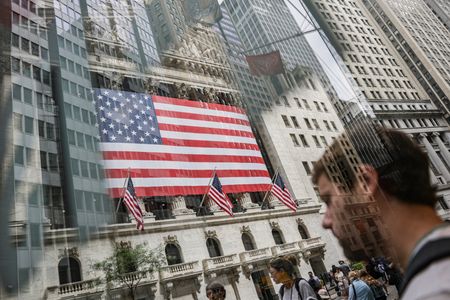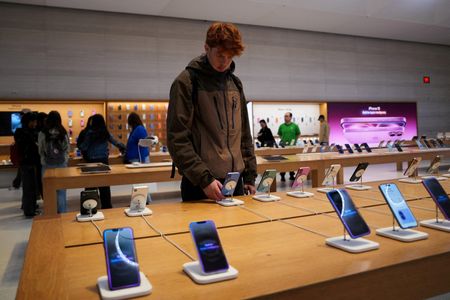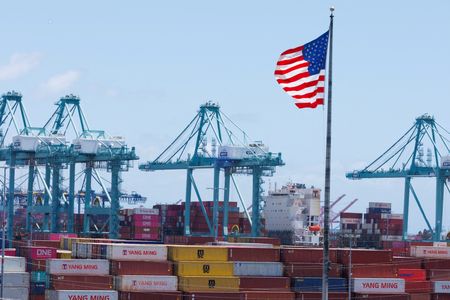(Corrects name of company in paragraph 5 to State Street Investment Management from State Street Global Advisors)
By Carolina Mandl, Suzanne McGee and Davide Barbuscia
NEW YORK (Reuters) -A rebound on Wall Street and in the dollar has not allayed investor concerns about the ability of U.S. assets to outperform overseas markets, with a fresh tariff salvo once again denting market optimism after a string of trade deals struck by the Trump administration perked up sentiment for equities to set record highs.
The sliding dollar, down about 8% this year against a basket of major currencies, and the ballooning fiscal deficit are shaking the conviction that U.S. financial markets will deliver world-beating returns.
For more than a decade, the concept of “American exceptionalism” – the conviction that the United States’ democratic system plus its huge and liquid capital markets offer unique rewards – has been little challenged by investors.
But ongoing uncertainty surrounding tariffs is rattling confidence. While the deals struck by Donald Trump with the European Union, Japan and South Korea have delivered some relief, the U.S. president late on Thursday slapped dozens of trading partners with steep tariffs.
A market shakeout earlier this year caused by Trump’s first tariff announcements triggered a re-evaluation. The U.S. market’s standing appears “a little bit bruised,” said Lori Heinel, global chief investment officer at State Street Investment Management.
“The overhang of the (government) debt makes it less attractive to have dollar-based assets,” she added.
In a survey conducted in late May and June, market research consultancy CoreData found that many institutional investors and consultants, collectively overseeing $4.9 trillion in assets, are scaling back exposure to the U.S. Among respondents, 47% are cutting their strategic, long-term allocations to U.S. markets.
While investors have become more upbeat on the outlook for Europe, as well as for China and other emerging markets, bullishness toward U.S. markets now lags those regions. That, said Michael Morley, head of CoreData US, marks “a massive reversal” from attitudes two years ago.
The latest wave of tariffs on exports from dozens of trading partners, including Canada, Brazil, India and Taiwan, sent global markets tumbling on Friday.
The announced duties were “somewhat worse than expected,” analysts at Societe Generale said in a note.
“Markets responded more negatively to the August 1 announcement than to other news in the past two months, but the reaction was far less severe than on April 2,” they said.
TARIFF IMPACT OVERDUE?
Investors began reconsidering their allocations following Trump’s “Liberation Day” tariff announcement on April 2, reassessing the allure of “brand USA” and fretting about a new recession.
The Trump administration then paused tariff rollouts and subsequently began announcing deals that cap tariffs at lower levels than initially proposed. Stocks rebounded, with the S&P 500 soaring 27.2% from its April 8 close to its July 31 close, setting a series of new records.
CoreData, however, found that 49% of institutions believe that markets now are too complacent about the impact of U.S. tariffs.
U.S. consumer prices increased by the most in five months in June, according to Consumer Price Index data, suggesting that tariffs are boosting inflation. Other data points to a moderation in economic activity, and second-quarter growth was mainly strong because imports were weak.
Global asset manager Man Group, which manages roughly $193 billion, is wary of overweighting U.S. assets.
“This is an opportunity for investors to take some profits, rebalance and go to neutral on the U.S.,” said Kristina Hooper, chief market strategist at Man Group.
BEYOND TARIFFS
The dollar’s status as the global reserve currency may be in question as the U.S. forfeits the role of free trade facilitator, said Thierry Wizman, global FX and rates strategist at Macquarie Group, adding the firm expects to sell the dollar on any rally.
After suffering its worst first-half performance since 1973 this year, the dollar posted its first monthly gains for 2025 in July, as investors regained confidence in the wake of trade deals.
Also contributing to the reassessment of U.S. market supremacy is the risk of monetary policy being politicized. Trump has repeatedly called for lower interest rates and threatened to remove Federal Reserve Chair Jerome Powell.
A recently approved tax and spending bill, meanwhile, will add trillions to the government’s debt, exacerbating longstanding deficit concerns. Investors are likely to respond by seeking higher compensation for the risk of owning long-dated Treasury securities
“There’s very, very real risk that yields go significantly higher because of the deficit,” said Man Group’s Hooper.
U.S. INNOVATION
For many, the buoyant U.S. stock market and optimism surrounding the U.S. tech sector have made it hard to turn bearish.
“The bottom line is that the U.S. has some of the most innovative and profitable companies in the world, and the deepest capital markets,” said Kelly Kowalski, head of investment strategy at MassMutual. Anxiety about the demise of U.S. pre-eminence is “overblown,” she said.
Concerns over weaker foreign demand for U.S. debt have eased in recent weeks. After selling a net $40.8 billion of Treasuries in April, foreigners resumed buying to the tune of $146 billion in May, the latest government data showed.
Also, while European stocks handily beat their U.S. counterparts in March, that gap has narrowed with every new trade deal announced. As of the end of July, Europe’s STOXX 600 was roughly neck and neck with the S&P 500.
“The big factor in the room has nothing to do with policies, but technology,” said Richard Lightburn, deputy chief investment officer at macro hedge fund MKP Capital Management. “It still feels like early innings for AI adoption and integration.”
Anthony Saglimbene, chief market strategist at Ameriprise Financial, continues to recommend a slight overweight to U.S. stocks relative to other global markets. “Call it ‘exceptionalism’ or just ‘clarity.’ The macro environment in the U.S. is comparatively more stable.”
(Reporting by Carolina Mandl and Davide Barbuscia in New York and Suzanne McGee in Providence, Rhode Island; Additional reporting by Laura Matthews in New York; Editing by Alden Bentley and Matthew Lewis and Chizu Nomiyama)











